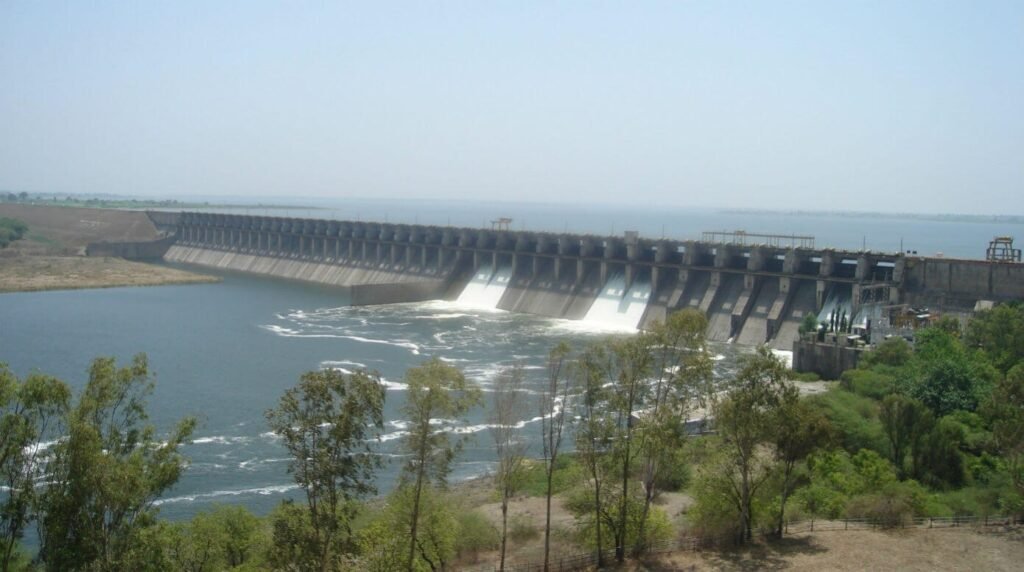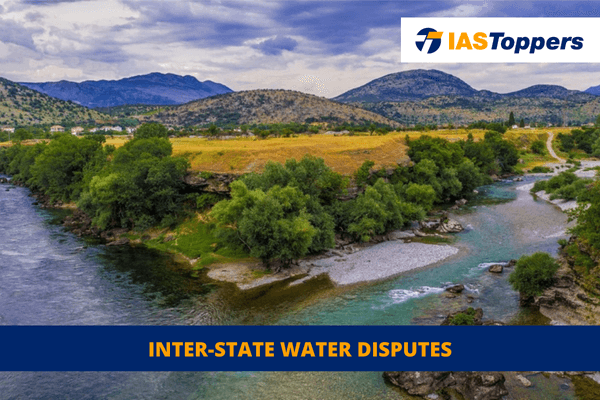Inter-State Water Disputes occur when multiple state governments encounter conflicts or disagreements concerning the utilization and distribution of shared water bodies or resources. In this article, you will learn definition, acts, list of Inter-State water disputes in India, causes of Inter-State Water Disputes in India, issues with the mechanism, providing key insights for GS Paper-II Indian polity section of UPSC IAS Exam.
Table of Content
- What are Inter-State Water Disputes?
- Constitutional provisions for Inter-State Water Disputes
- The River Boards Act
- The Inter-State Water Disputes Act
- Significance of such mechanisms
- List of Inter-State Water Disputes in India
- Issue with the mechanism
- Conclusion
- Frequently Asked Questions
- Reference
What are Inter-State Water Disputes?
- Inter-State Water Disputes occur when multiple state governments encounter conflicts or disagreements concerning the utilization and distribution of shared water bodies or resources.

Constitutional provisions for Inter-State Water Disputes:
- Entry 17 of the State List- Schedule VII empowers the state government to take decision regarding water-related matters such as water supply, irrigation, canals, drainage, embankments, water storage, and water power.
- Entry 56 of the Union List- Schedule VII empowers the Union Government to regulate and develop inter-state rivers and river valleys as deemed necessary by Parliament in the public interest.
- According to Article 262 of the Constitution, interstate water disputes in India are resolved through specific provisions including.
- The Parliament has the power to pass laws for the settlement of disputes related to the use, distribution, and control of inter-state rivers and river valleys.
- The Parliament has the power to exclude the jurisdiction of the Supreme Court and other courts from such disputes.
- The Indian Parliament has enacted two laws- the River Boards Act (1956) and the Inter-State Water Disputes Act (1956).
The River Boards Act:
- It provides provision for establishment of river boards, which regulates and develops inter-state rivers and river valleys.
- The river boards are established by Central government upon the request of the state governments.
The Inter-State Water Disputes Act:
- It empowers the Central government to establish ad hoc tribunals for the resolution of disputes between 2 or more states over inter-state rivers or river valleys.
- The decisions made by these tribunals are final and binding on the parties involved.
- There is no jurisdiction granted to the Supreme Court or any other court if such water dispute has already been referred to the tribunal constituted.
Significance of such mechanisms:
- The establishment of these extra judicial mechanisms will help address inter-state water disputes more effectively.
- Even though the Supreme Court has jurisdiction over disputes involving legal rights, but the complexities of the proper utilization of water resources required a different approach.
- Experience from other countries suggests that rules of law governing private proprietary interests related to water will not provide a satisfactory framework for resolving disputes between states.
- As of 2019, the Central government has established 9 inter-state water dispute tribunals.
- Inter-State River Water Disputes (Amendment) Bill, 2019 was earlier tabled on parliament.
List of Inter-State Water Disputes in India:
| Name | Set-up in | States Involved | Active/Inactive |
| Krishna Water Disputes Tribunal-I | 1969 | Maharashtra, Karnataka and Andhra Pradesh | Active |
| Godavari Water Disputes Tribunal | 1969 | Maharashtra, Karnataka, Andhra Pradesh, Madhya Pradesh and Odisha | Inactive |
| Narmada Water Disputes Tribunal | 1969 | Rajasthan, Gujarat, Madhya Pradesh and Maharashtra | Inactive |
| Ravi and Beas Water Disputes Tribunal | 1986 | Punjab, Haryana and Rajasthan | Active |
| Cauvery Water Disputes Tribunal | 1990 | Karnataka, Kerala, Tamil Nadu and Puducherry | Inactive |
| Krishna Water Disputes Tribunal-II | 2004 | Maharashtra, Karnataka and Andhra Pradesh | Inactive |
| Vansadhara Water Disputes Tribunal | 2010 | Odisha and Andhra Pradesh | Active |
| Mahadayi Water Disputes Tribunal | 2010 | Goa, Karnataka and Maharashtra | Active |
| Mahanadi Water Disputes Tribunal | 2018 | Odisha and Chhattisgarh | Active |
Issue with the mechanism:
- Protracted proceedings and extreme delays in dispute resolution:
- Example: Godavari and Krishna disputes started around 1956 but the matter was referred to a tribunal in 1969.
- Opacity in the institutional framework and guidelines that define these proceedings.
- The absence of authoritative water data that is acceptable to all parties makes it difficult to set up a baseline for adjudication.
- State governments have many times rejected tribunal awards.
- Example: the Punjab government rejected the judgement of the Ravi-Beas tribunal.
Conclusion
Inter-state water disputes pose challenges in the equitable allocation and management of water resources among different states. These disputes arise due to increasing demands, scarcity etc. Inter-state water tribunals having more specialised and appropriate technical knowledge is more effective in resolving such disputes.
Ref: Source-1
FAQs (Frequently Asked Questions)
What are Interstate water disputes?
Interstate Water Disputes occur when multiple state governments encounter conflicts or disagreements concerning the utilization and distribution of shared water bodies or resources
What is the main provision of River Boards Act?
It provides provision for establishment of river boards, which regulates and develops inter-state rivers and river valleys. The river boards are established by Central government upon the request of the state governments
What is the main provision of The Inter-State Water Disputes Act?
It empowers the Central government to establish ad hoc tribunals for the resolution of disputes between 2 or more states over inter-state rivers or river valleys.
How many Inter-State water dispute tribunal have been set up so far in India?
Till now 9 Inter-State water dispute tribunal have been set up in India.
Can Supreme Court interfere in Inter- State water disputes?
Supreme Court cannot interfere in Inter- State water disputes.


